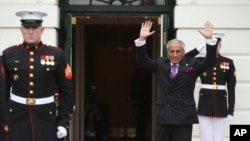The Pakistan prime minister’s foreign policy aide tells VOA that Pakistan-India relations are “passing through a difficult phase” and that Islamabad would be open to offers of assistance regarding talks with New Delhi, including from the incoming Trump administration.
Late last month, President-elect Donald Trump and Pakistani Prime Minister Nawaz Sharif held an unusually frank conversation that included the incoming U.S. leader telling Sharif he would be willing to help Pakistan resolve its outstanding issues with India.
“I am ready and willing to play any role that you want me to play to address and find solutions to the outstanding problems. It will be an honor and I will personally do it,” Trump said in a transcript of the phone call.
The government’s readout of the very casual phone call, in which Trump said Sharif was “a terrific guy” doing “amazing work,” raised considerable debate over diplomatic practices. Sharif had called to congratulate Trump on his election win.
Kashmir issue
Tariq Fatemi, Sharif’s key foreign policy aide, said earlier this month that Trump’s offer was referring to Pakistan’s long-running dispute with India over the Kashmir region, which is split between Pakistani and Indian control and claimed in its entirely by both nuclear-armed rivals.
On Thursday, Fatemi told VOA’s Urdu service the entire region wants Pakistan and India to “end this state of acrimony and hostility.”
“Pakistan is open to a sustained dialogue,” he told VOA. “India and Pakistan, in my humble view, have no other option but to talk to each other.”
Asked if Trump could help mediate talks between Muslim-majority Pakistan and neighboring Hindu-led India, Fatemi said, “Any assistance, any help, any intervention, any offer of good offices (people) that have good relations with both India and Pakistan will be welcome.”
While Pakistan previously has sought U.N. or U.S. mediation over Kashmir, India has long opposed involving a third party mediator.
In speaking with VOA’s Urdu service, Fatemi said Pakistan looks “forward to engaging in very substantive ways with the incoming administration, particularly” with the State and Defense departments.
Fatemi is ending a 10-day mission to Washington to talk with members of Trump’s transition team as well as to brief members of Congress and research institutions on Pakistan’s efforts to counter terrorism and promote regional peace and stability.
The U.S. has blamed Pakistan for years for being behind the rise of the Taliban insurgency in Afghanistan, where thousands of U.S. troops are battling terrorist groups and training Afghan security forces.
Taliban issue
Officials say the porous 2,600-kilometer Pakistan-Afghanistan border encourages illegal insurgent movements, and the presence of nearly 3 million Afghan refugees in Pakistan affords Taliban militants a hiding place. Islamabad has denied, however, that Taliban insurgents are sheltering in Pakistan.
“We are involved in peace in Afghanistan. We have a conviction that peace and stability in Pakistan is dependent to peace in Afghanistan,” he told VOA. “Our economic and energy plans with Central Asia and trade to Eastern Europe can only happen if there is stability in Afghanistan.”
Fatemi said Pakistan is “willing to play a role in the Afghan peace process,” but to do that “Pakistan and Afghanistan will have to take their military and intelligence relationship to a higher level.”
“We used our limited influence on Taliban to bring them on the table. It didn’t sustain because they (Taliban) think that the incentives are not attractive enough,” he said. “Some think that there are divisions with Taliban leadership; some think that foreign powers send conflicting signals to them.”
On December 9, Fatemi met with U.S. National Security Advisor Susan Rice at the White House, where the two discussed anti-terrorism measures and defense, as well as human rights violations in the Kashmir region.
Ayaz Gul in Islamabad and Anjana Pasricha in New Delhi contributed to this report.





